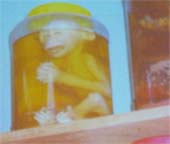'No place where wild animals fall as fast as in Vietnam'

The precious monkeys became "tonic" like this.( Photo: WWF )
1 in 2 people in Hanoi has been consuming wild animals. The more money people consume, the more powerful they are, and the "specialty" is becoming fashionable, symbolizing the status of the class of civil servants and businessmen.
This is the initial result of a TRAFFIC survey of more than 2,000 households in Hanoi recently announced this afternoon.
Vietnam is the 16th most biologically diverse country in the world, with over 75 unique species only our country has.
The first survey conducted in Vietnam found that the majority of Hanoi residents do not know the basic rules for protecting threatened species and their habitats in Vietnam. Although most people know about the concept of extinction, they all think that rare and endangered animal and plant species are due to hunting, loss of habitat . and nothing to do with them. " eat specialties "or use them as tonic, jewelry .
A clear trend is found that the more money a person has, the higher his status is, the more wildlife he uses. If only less than 3% of people with wages less than 1 million "dare" to strongly consume high-end specialties, this figure in those with incomes between 1 and 5 million is 64%. People with postgraduate qualifications account for 39% of the specialties, while the group with lower secondary education is only 6%. In particular, civil servants and businessmen are increasingly dominant in this consumer group, and view them as expressions for "class" when entering the restaurant.
Despite the bans, many carefree people hunt for high tiger bones, bear bile, deer velvet, rhino horn . for medical treatment or home decorations. The above results show that the propaganda or long-standing legal provisions of Vietnam on this issue are almost exclusively meaningful in the text, not affecting the people.
" Many of the most consumed wildlife species in Vietnam are on the list of endangered international trade in plant and animal species (CITES) that Vietnam participated in 1994, and is protected by Vietnamese law , "said Sulma Warne, Coordinator of TRAFFIC Southeast Asia.
" The consumption of wild products has become the most serious in recent decades when the economy of the people is quite up, causing destruction of the ecosystem, severely affecting the populations and the environment. "Mr. Warne emphasized.
The above survey is only part of the " Behavior Change - Reducing the consumption of wildlife products in Hanoi, Vietnam " project, funded by Denmark, from 2005 to 2007. .
" Although there has been sanctions for those who possess, store and trade in illegal wildlife, Vietnam has no sanctions against consumers of these 'specialties'. " , Mr. Nguyen Van Cuong, Deputy Director of Vietnam Forest Protection Department.
In parallel with the survey, WWF Indochina Program with TRAFFIC also launched a contest of advertising film production from now until May, which participants are all high school students in Hanoi. . Accordingly, each test must consist of two parts, describing and explaining the idea of a 30-second ad, highlighting the slogan " Don't trade the natural life to satisfy your needs ".
The 3 best ideas will be awarded, the reward is a Canon digital camcorder. The author of the idea will be attending a training course on film production in June, taught by American filmmakers. After the course, the students will select actors and film themselves. After finishing, these 3 ads will be broadcast on VTV many times next year. Regulations of the contest are available on the website http://www.wwfindochina.org/news%2Binfo/news.htm
A hotline is also established at Hanoi Forest Protection Department, phone number 04 -932-3333. Anyone who encounters illegal trading, storing and consuming wildlife can call this phone number for the Department to investigate and solve.
At universities, WWF will also organize clubs and forums to warn about illegal consumption of wildlife.
" Nowhere is the wild population declining at an alarming rate like Vietnam, all due to illegal trade and consumption ," said Eric Coull, WWF Greater Mekong Representative. expression. And for Vietnam to not become "white space" for rare and precious creatures, it is necessary to have the contribution of each person, first of all stop eating the illegal wildlife.
Thuan An
- Melting the heart with the extremely cute otter of Vietnam
- Photography: 'Talking eyes' of wild animals
- These bizarre animals in nature in Vietnam
- Animals live in the hottest place in the world
- American wild boar 'invades' Mexico
- Beam of photos: The survival battle of wild animals
- 7 differences between animals and wild animals
- Why did Australia destroy 2 million cats?
- Fascinating wild dogs with lovely looks, personality like wolves
- Life in puddles
- Strange tragedy of children living with wild animals
- DNA testing for wild dogs suddenly discovered the rare animals on the planet
 Vietnam 5th Asian champion on fuel-efficient vehicles
Vietnam 5th Asian champion on fuel-efficient vehicles We can read all NASA studies completely free of charge
We can read all NASA studies completely free of charge Singer and songwriter Bob Dylan won the 2016 Nobel Prize for Literature
Singer and songwriter Bob Dylan won the 2016 Nobel Prize for Literature Scientific revolution in Asia
Scientific revolution in Asia